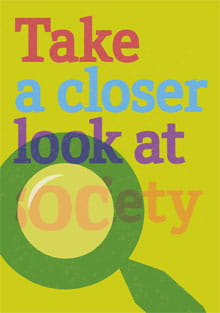-
Yes, sociology is a science
-
No, sociology is not a science but it could be
-
No, sociology is not a science and it should not try to be one.
Using materials from some of the exam board websites, for example
Discover More AQA
Discover More OCR
students should work in groups to locate past questions on this topic (in the light of recent reform remind them to look also at legacy specification materials). The past questions, as mentioned above, will have associated mark schemes and examiners reports that will point them in the direction of material they can include in their table.
This is a very useful exercise as ‘being the examiner’ can help when it comes to revision and exam preparation. Mark schemes may look a little daunting for students at first but being able to use them will help with their revision.
For a more advanced discussion, you might want to consider asking if Sociology should attempt to be a science at all? After all, what’s so good about science? This is an interesting question posed by Ted Porter in his 1996 book Trust in Numbers. Numbers are often seen to be objective and neutral; numbers do not lie. They are therefore an important political tool, as politicians and leaders like to draw on numbers and statistics to make their arguments and justify their position. Therefore, we could see numbers and statistics as the tools and methods of the powerful. So-called objective truths that are used to convince the population of ‘the facts’. And hence, academic subjects that wish to be taken seriously (and funded) need to (literally) play the numbers game, and produce serious and objective number and statistics. However, as many Sociologist would tell you, life is not easily reducible to numbers, and numbers, can often lie or certainly, do not always tell the whole story. Hence, should Sociology ever attempt to be ‘scientific’ or maybe it should be there to challenge the social order and the esteem placed upon scientific method and statistic?












